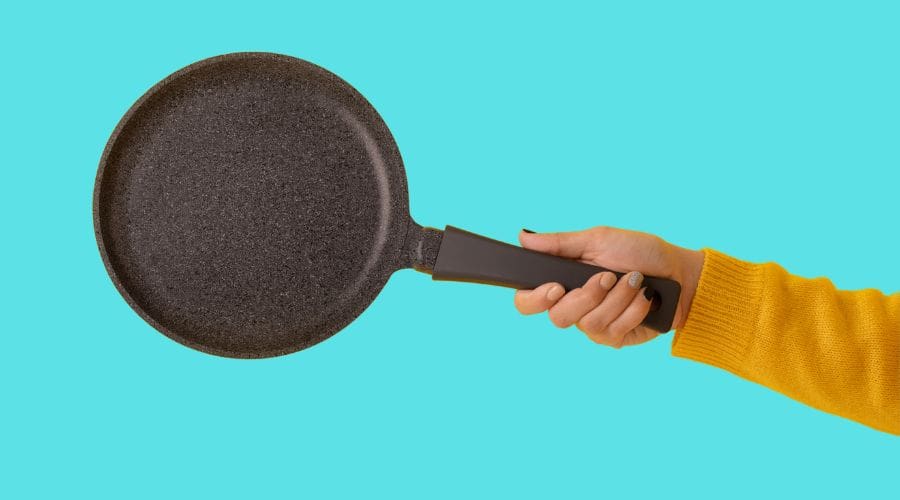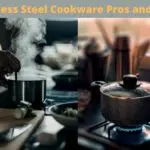Granite Cookware Pros and Cons you should know about

Granite cookware has become increasingly popular as a durable and attractive option for home cooks and professional chefs. Made from a hard, porous material, granite cookware is resistant to scratches and warping and is available in various colors and designs.
Additionally, granite cookware is non-reactive, making it suitable for cooking many recipes.
However, granite cookware also has some drawbacks that should be considered before purchasing. This type of cookware is typically heavier than other options, making it challenging for some people to handle.
We will examine the pros-cons of granite cookware in detail, including its durability, non-reactivity, and attractive appearance, and compare it to stainless steel and nonstick cookware.
Whether you are in the market for new cookware or simply considering the granite cookware pros and cons, this article will provide you detail information you need to make an informed decision.
Pros Of Granite Cookware
Durability
Granite cookware is made from a hard, porous material resistant to scratches and warping. This makes it a durable option that can last many years with proper care.
Non-Reactivity
Granite cookware is non-reactive, which will not discolor or react with acidic foods. This makes it an excellent option for cooking a wide range of recipes.
Attractive
Granite cookware is available in various colors and designs, making it a stylish addition to any kitchen.
Improved Cooking Performance
The thick, porous nature of granite cookware helps in extreme heating, resulting in improved cooking performance.
Oven Safe
Many granite cookware pieces are oven safe, allowing for versatility in cooking tasks.
Cons Of Granite Cookware
Heavy
Granite cookware is typically heavier than others, making it challenging for some people, especially those with arthritis or other conditions that affect hand mobility.
Poor Heat Conductivity
Granite cookware is not a good conductor of heat, so it may not heat as evenly as other types of cookware, like stainless steel.
Expensive
Granite cookware is often more expensive than other types, like nonstick or stainless steel.
Requires Special Care
Granite cookware requires special care, such as hand washing and avoiding harsh abrasive cleaners, to maintain its appearance and performance over time.
Granite vs Stainless Steel Cookware
Granite and stainless steel are two of the most popular materials used in cookware today. Each has its own benefits and drawbacks, so it’s important to understand the differences between them before making a purchase.
Granite cookware is made from natural stone that’s mined from quarries around the world. It’s extremely durable and is the most popular material used in high-end cookware. Granite cookware has a nonstick coating, meaning that nothing sticks to it and food cooks evenly. The surface also won’t scratch or dent easily, making it an ideal choice for busy kitchens.
Stainless steel cookware is made from a combination of steel alloys that are heated and molded into pots and pans. It’s considered to be the most durable type of cookware on the market, as it won’t corrode or rust like other materials can. Stainless steel also has great heat conductivity, meaning that food cooks quickly and evenly.
What Are Things You Should Consider While Buying The Best Granite Cookware?
When looking for the best granite cookware, it is vital to consider a few key factors:
- It would help if you focused on a pan that has a heavy-duty metal base or core to ensure even heating and improved performance.
- It would help if you focused on a pan that has a thick, durable granite layer to help prevent scratches and other damage.
- It will help if you are looking for an oven-safe pan, as this will allow you to use it for a wide range of cooking tasks.
Granite Cookware Vs. Nonstick
There are several key differences to consider when comparing granite cookware to nonstick cookware. Nonstick cookware is typically made from a lightweight material coated with a nonstick material, such as Teflon. This makes it ideal for cooking delicate foods, like eggs, as they will not stick to the surface.
Nonstick cookware is also typically easy to clean and store, as it is lightweight and does not require much maintenance.
On the other hand, granite cookware is a heavier, more durable option ideal for cooking a more comprehensive range of foods. The thick, porous granite layer provides excellent heat retention.
Granite Cookware Vs Stainless Steel Vs Nonstick
When comparing granite cookware to stainless steel and nonstick, it is important to consider the various pros and cons of each type.
Stainless steel is lighter than granite cookware, making it easier to handle. It also transfers heat well, which results in more even cooking. On the downside, stainless steel can be scratched and damaged if used improperly.
Nonstick cookware is lightweight, easy to clean, and provides even heating. However, nonstick can be scratched easily and the coating can deteriorate over time. Some nonstick coatings also contain potentially harmful chemicals that leach into food when heated.
Overall, granite cookware offers a durable option with good heat absorption and non-reactivity, but it can be heavy, difficult to care for, and expensive.
Is Granite Cookware Safe?
One of the main concerns about granite cookware is whether or not it is safe to use. Many of us worry that granite’s porous nature may allow harmful chemicals to leach into their food.
However, this is fine with high-quality granite cookware. The best granite cookware is made from food-grade materials that are free from harmful chemicals and safe for use in the kitchen.
What is the Best Granite Cookware?
When it comes to finding the best granite cookware, there are many options available. Some of the most popular brands include Michelangelo, and Home Hero.
Conclusion
There are various Granite cookware pros and cons. It is a durable, attractive, and safe option for cooking a wide range of foods. While it has its advantages, like improved cooking performance and non-reactivity, it also has some disadvantages, like a heavy weight and high cost.
When choosing granite cookware, it is essential to carefully consider your cooking needs and preferences to determine if it is the best choice for you.
FAQs
What is granite cookware made of?
Granite cookware is typically made of a combination of ceramic, clay minerals, and other materials. It is designed to provide superior heat retention and distribution while also being highly durable.
Is granite cookware safe to cook with?
Yes, granite cookware is generally considered safe to cook with as it is non-reactive and does not contain harmful chemicals. However, it is essential to choose a set with a safe nonstick coating if one is desired.
Is granite cookware heavy?
Granite cookware is typically heavier than other types, like stainless steel or nonstick.




